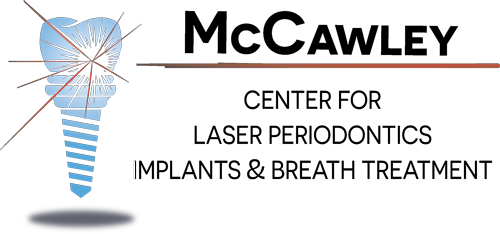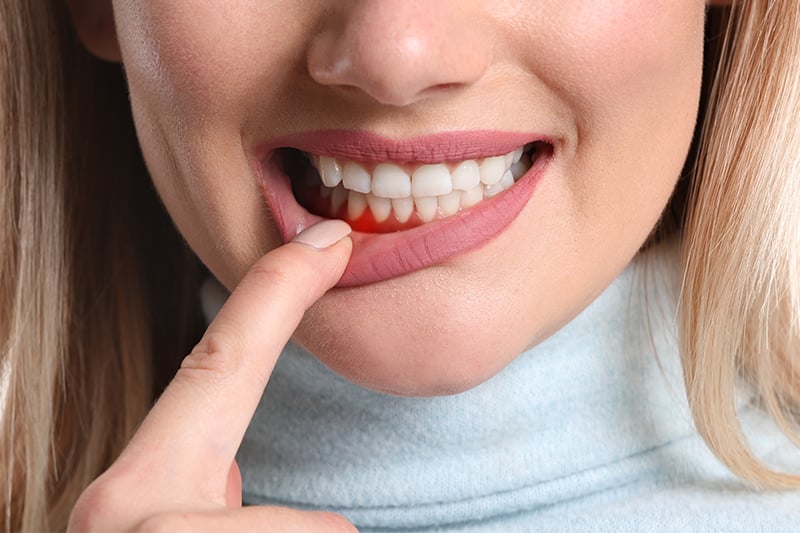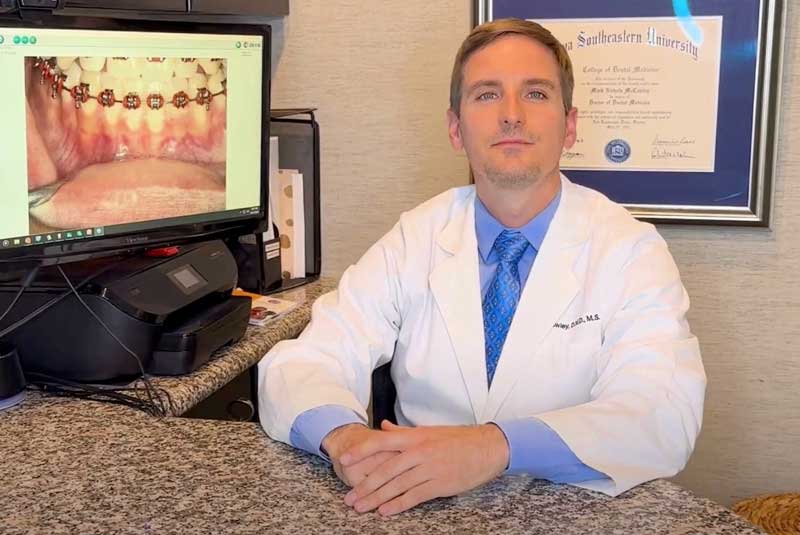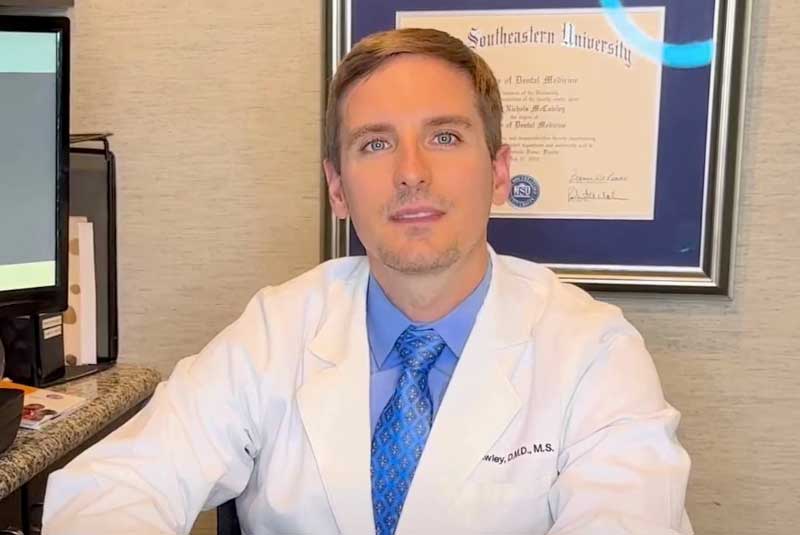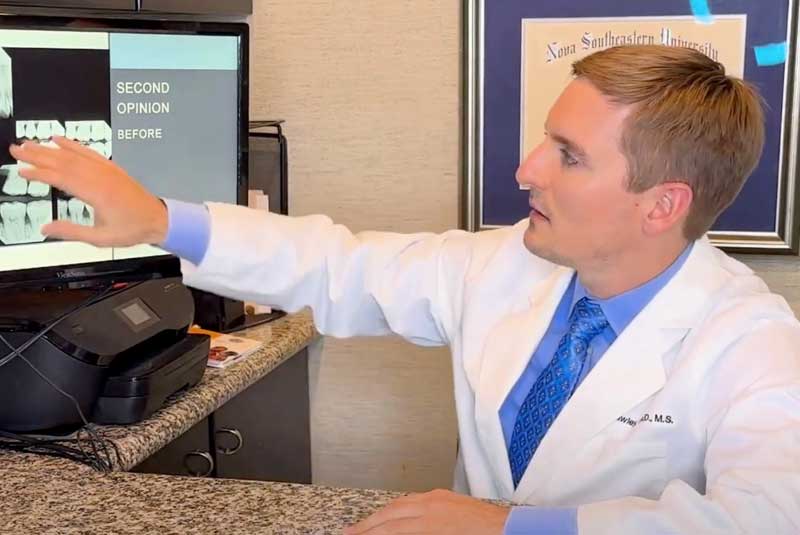| ✅ Reviewed by Dr. Tom McCawley | 🕒 Reading time: five minutes |
Gum disease can affect your smile and your overall health. From persistent bad breath to the risk of tooth loss, untreated gum disease can cause lasting harm to your oral health.
But here is the good news: gum disease can usually be cured.
Our team is dedicated to saving your teeth and implants with the most advanced therapies available, including antimicrobial treatment and LANAP laser dentistry.
In this blog, we explain how gum disease develops, when it can be reversed, and treatment options that help protect your teeth and restore gum health.
What Is Gum Disease?
Gum disease, or periodontal disease, is a bacterial infection that attacks the gum tissue and bone supporting your teeth.
It begins with plaque buildup, a sticky film of bacteria that forms around your teeth and gums. If not removed through regular brushing and professional cleanings, this plaque hardens into tartar and triggers inflammation.
As the infection progresses, it damages the connective tissues, leads to bone loss, and in advanced stages, can cause loose teeth or even tooth loss.
The Stages of Gum Disease
Understanding the stages of gum disease helps you know what is reversible and what requires professional care:
- Gingivitis (earliest stage): Gums may be red, swollen, or bleed when brushing. At this stage, the condition is reversible with improved oral hygiene and routine dental cleanings.
- Moderate periodontitis: The infection moves deeper, forming pockets around the tooth roots. Antimicrobial therapy and deep cleaning are typically needed to manage it.
- Advanced periodontitis: This severe form can result in significant bone loss and tooth mobility. Laser gum therapy, like LANAP, may be needed to save the teeth and restore some lost bone.
Gum Disease Treatments
At the McCawley Center for Laser Periodontics and Implants, we offer evidence-based treatments that target the root cause, harmful bacteria.
Antimicrobial Therapy
Our team uses a phase-contrast microscope to identify the specific bacteria damaging your gums. We then use targeted antimicrobial treatments, including custom antibiotics and antimicrobial mouthwash, to stop the infection at its source.
LANAP® Laser Therapy
For more advanced stages, we use LANAP®, a laser-assisted gum treatment that removes diseased tissue without cutting. It also stimulates new bone and tissue growth around the tooth roots, making it a powerful option for treating advanced gum disease.
Deep Cleanings
Also known as scaling and root planing, deep cleanings remove plaque buildup below the gumline and smooth the root surface so gum tissue can heal.
Ongoing Support
Preventing recurrence is key. We support patients with regular dental cleanings, personalized education on oral hygiene practices, and guidance on how medical conditions and lifestyle factors (like smoking) may increase the risk of gum disease.
Lifestyle Habits That Support Gum Health
Daily choices play an important role in preventing gum disease and maintaining long-term oral health. In addition to professional treatments, these habits can reduce your risk of infection and help preserve your gums:
- Brush and floss consistently and irrigate with an antiseptic: Brush at least twice a day with a soft-bristled toothbrush. Floss and irrigate with an antiseptic rinse at least once a day to remove plaque between teeth.
- Tongue scrape: Use a tongue scraper once a day to remove bacteria and food debris from the surface of your tongue. This helps reduce the overall bacterial load in your mouth and can improve breath and support healthy gums.
- Avoid tobacco products: Smoking and vaping increase the risk of gum disease and slow down healing.
- Eat a healthy diet: Focus on fruits, vegetables, lean proteins, and whole grains. Limit sugar and processed foods that feed harmful bacteria.
- Stay hydrated: Drinking water helps wash away food particles and supports saliva production, which protects your mouth from plaque buildup.
- Manage underlying health conditions: Conditions like diabetes and heart disease are linked to periodontal disease. Controlling them helps support gum health.
- Schedule regular dental visits: Professional cleanings and checkups allow early detection and treatment of any gum-related issues.
Small changes in daily habits can have a big impact on your gum health and overall well-being.
Early Action = Long-Term Oral Health
Catching gum disease in its earliest stage can help you avoid irreversible damage like tooth loss, gum recession, and advanced surgical procedures like gum grafts or bone grafting.
If you have symptoms of periodontal disease like bad breath, bleeding gums, or early signs of infection, don’t delay seeking treatment. The sooner gum disease is caught, the easier it is to treat!
Our periodontists, Dr. Tom McCawley and Dr. Mark McCawley, offer personalized periodontal care designed around your needs, comfort, and long-term results.
To book an appointment at our periodontal office in Ft. Lauderdale, FL, call (954) 807-4829 or visit us at 800 East Broward Blvd #706 Fort Lauderdale, FL.
FAQs: Can Gum Disease Be Reversed?
Once gum disease progresses to advanced periodontitis, it cannot be fully reversed. However, it can be stabilized. With LANAP and antimicrobial therapy, we can control and often cure the infection and usually regrow some of the bone. is the answer.
Yes, gingivitis, the earliest form of gum disease, can go away with consistent oral hygiene and professional cleanings. More advanced stages can be managed long term with proper personal and professional care..
Gum tissue does not naturally regrow once lost, but procedures like LANAP can help regenerate lost connective tissues and bone, and treatments like the Pinhole Surgical Technique may restore gum coverage in some cases.
You can reverse gingivitis at home with good oral hygiene, regular brushing, and flossing. But once the disease progresses beyond the earliest stage, you will need gum disease treatment from a professional to prevent irreversible damage.
